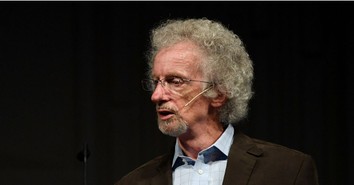3 Ways to Come Back from a Crisis of Faith

One of the most frightening things a Christian can go through is a period of real doubt about God. Whether it is illness, depression, loss, or any number of other factors, sometimes we just get lost, beginning to have serious uncertainty regarding the reality of God.
We don’t know what to do, or where our faith has gone. We used to turn to the Bible, but now it sits unread on the nightstand. Up until recently, we attended church regularly, but now it seems like a pointless exercise. Our prayer life is non-existent. If we do share how we feel with other Christians, we resist their attempts to help us back to the path.
Luke 8:13 reminds us of our human susceptibility for loss of faith: “Those on the rocky ground are the ones who receive the word with joy when they hear it, but they have no root. They believe for a while, but in the time of testing they fall away.”
What do we do when the belief that sustained us feels hollow, or even unreal—like a fairytale that once pleased us but now seems hollow?
Rest assured, God and his son Jesus Christ are very real, and they love you even now, in your faith crisis.
Here are a few things you might do to return to faith:
1. Analyze When Your Faith Changed—And Why
Has there been a precipitating event in your loss of faith? Perhaps you have lost a spouse or a close loved one. Or, you recently received a devastating medical diagnosis, and wonder where the God who loves you so much is, in all of this heartache. Or, as Covid restrictions have dragged on, you feel a sense of drudgery and depression enfold you. Where praising God used to be a joy, it is now a senseless ritual.
Or, perhaps a well-known Christian you admire has lost their faith, and this has shaken your own. Whether this former faith leader is in your community or on the national stage, this can be unsettling. If that person whom you admire so can lose faith, why can’t you?
If you can get to the root of your loss of faith, this will serve you well. Then, be kind to yourself—as God is. You are human, and you are impacted by life’s storms. We wish we could see God with our eyes, but we can’t, and must believe by faith. This can be so very hard when times are tough.
If depression is the cause, getting good care may help restore your faith and revive interest in many other facets of life, too. God will walk with you, even if you can’t feel it yet. If you have suffered the loss of a loved one, Christ suffers with you. Be gentle with yourself and give yourself time to process your loss and adjust to your “new normal.” God is a concerned and merciful parent who loves you even when you can’t love back.
If you are seriously ill, this is hard and scary. While you take care of yourself physically, know this: God is ever-faithful and ever-present. He is there at your doctor’s appointments, all your scans and tests, and when you cry alone at night. If you can at least know this intellectually, you may soon feel God’s presence again in your heart, too.
“Come to me, all you who are weary and burdened, and I will give you rest. Take my yoke upon you and learn from me, for I am gentle and humble in heart, and you will find rest for your souls. For my yoke is easy and my burden is light.” (Matthew 11:28-30)
2. Remember, Giants of the Faith Have Had Serious Doubt, Too
Theologian, author, and noted Christian apologist C.S. Lewis had a crisis of faith after the death of his wife Joy to bone cancer, which he detailed in “A Grief Observed.”
He wrote, “Not that I am (I think) in much danger of ceasing to believe in God. The real danger is of coming to believe such dreadful things about Him. The conclusion I dread is not 'So there's no God after all,' but 'So this is what God's really like. Deceive yourself no longer.’”
He eventually came back to a different, deeper understanding of the Lord, writing, “God has not been trying an experiment on my faith or love in order to find out their quality. He knew it already. It was I who didn't. In this trial He makes us occupy the dock, the witness box, and the bench all at once. He always knew that my temple was a house of cards. His only way of making me realize the fact was to knock it down.” A beautiful way of stating God’s provenance on our lives and His plan for us, even when times are devastatingly hard.
Mother Theresa, one of the best-known saints of the Catholic faith who won a Nobel Prize for her tireless work for the poor in Calcutta, India, also had a decades-long crisis of faith.
In letters and diary entries discovered after her death and detailed in the posthumous biography, “Mother Theresa: Come Be My Light,” she explored a decades-long struggle with faith. She wrote in 1958: “My smile is a great cloak that hides a multitude of pains.”
In another letter, she also wrote, “The damned of Hell suffer eternal punishment because they experiment with the loss of God. In my own soul, I feel the terrible pain of this loss. I feel that God does not want me, that God is not God and that he does not really exist.”
How God used this woman who suffered such private torment! Her private reflections show an important and inescapable human commonality; we are prone to great doubt. But God will use even our doubt for wondrous purposes—Mother Theresa started her work with the poor when her doubts first began, leaving a privileged teaching post in Calcutta. Her work affected not just the people she directly ministered to, but others around the world who were touched and amazed by her shining example of giving of oneself.
If you are suffering a crisis of faith, remember that you are not alone—not today, in our present time, nor throughout the annals of time.
Immediately the boy’s father exclaimed, “I do believe; help me overcome my unbelief!” (Mark 9:24)
3. Take Baby Steps Back to Faith
If you are full of doubt, relax and take a deep breath. Faith—and life—are like a river that ebbs and flows. We have times we are brimming with faith, and life is rosy. Then we have low times—even spiritually dead times—where we cannot find our way back to God.
This is part of the human condition. Try to tell God how you are feeling, even if you have little hope of hearing back from Him, initially. Read books like “A Grief Observed” that trace another’s path from serious doubt back to vibrant faith.
Also, ponder Christ’s life. A poor carpenter from humble circumstances, he suffered and died, and yet his gospel message spread around the world. Many others have given their lives for the Christian faith, too. Would so many die for something that wasn’t true?
Above all, be kind to yourself and try to allow for this: God loves you. He hears you and believes in you, even when you can’t say the same about Him. He is a rock in the storm; occasionally the waves of life hide Him.
Trust in the Lord with all your heart and lean not on your own understanding; in all your ways submit to him, and he will make your paths straight. (Proverbs 3:5-6)
Photo Credit: ©GettyImages/beerphotographer

Originally published February 15, 2022.







